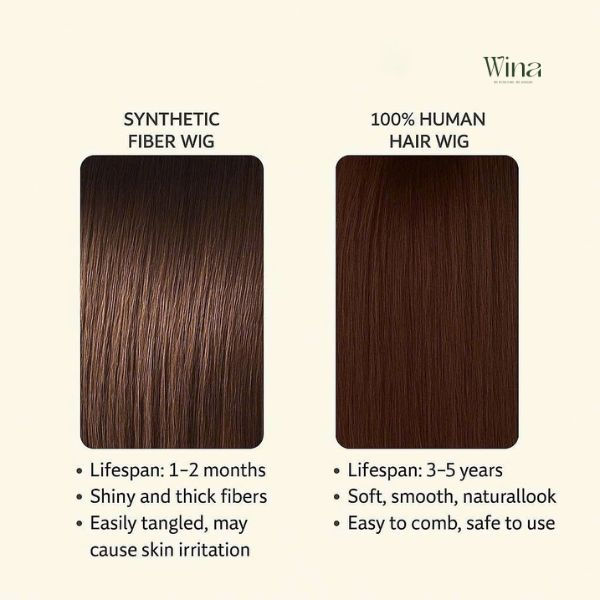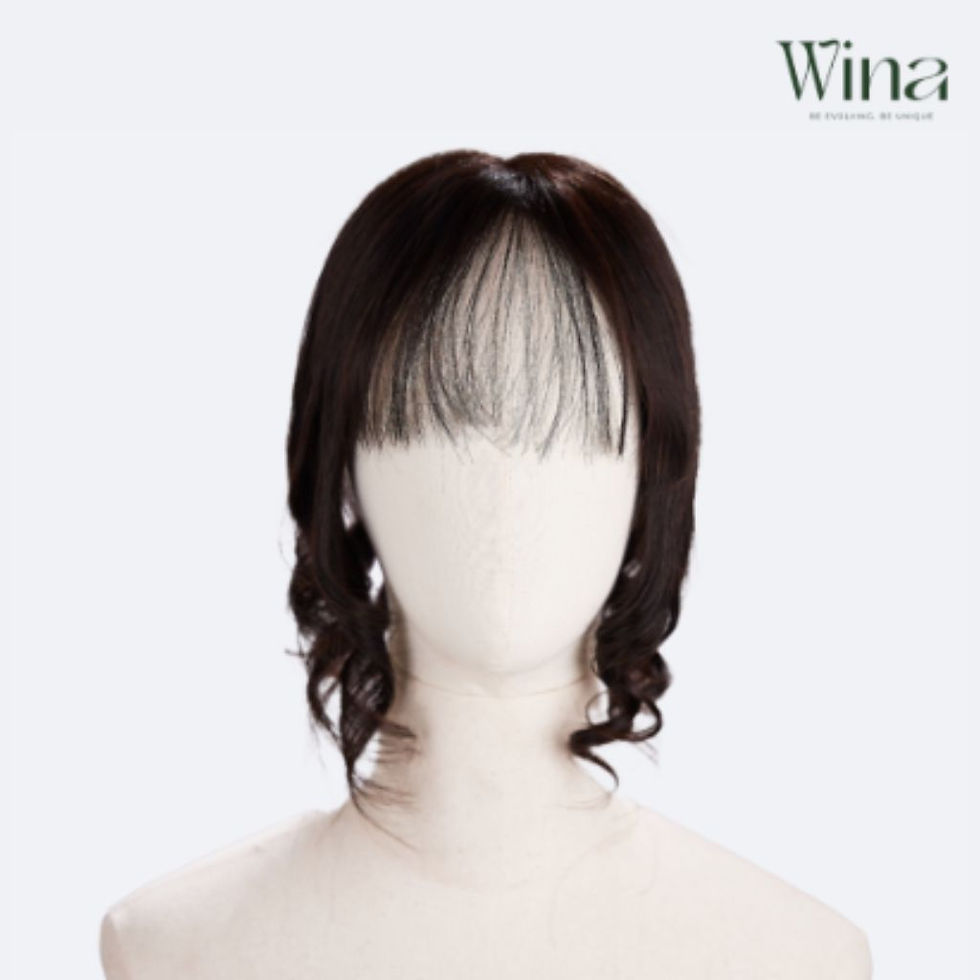What Is a Wig? Common Types of Wigs Available Today
- Anh Nguyễn
- Jun 24, 2025
- 4 min read
Have you ever looked in the mirror and felt like you were no longer yourself—just because of thinning hair, a balding crown, or premature graying? For many, hair is more than just part of their appearance; it represents confidence and identity. That’s why wigs—once seen merely as costume accessories—have now become essential companions on the journey to reclaiming beauty and self-worth.

So, what exactly is a wig? How many types are there, and which one is the right fit for you? Let’s dive into this Wina article to get the clearest and most comprehensive overview!
What Is a Wig? The History and Evolution of Wigs
A wig is a fashion accessory or cosmetic aid made from either real human hair or synthetic fibers, designed to replicate the look of natural hair. People wear wigs to cover imperfections such as bald spots, thinning hair, or premature graying—or simply to change their style without altering their real hair.
Wigs are removable hairpieces that are securely attached using nets, clips, or lace bases to create a natural look that mimics a real scalp. Today, wigs are not only a solution for those experiencing hair loss but also serve as essential tools in the worlds of beauty, fashion, and performance art.

Wigs date back to ancient Egypt, where they were worn by the nobility as a symbol of status. Throughout history—from the Renaissance period in Europe to today’s modern entertainment industry—wigs have consistently played a role in shaping personal style and identity.
Who should wear wigs?
People experiencing hair loss due to genetics, medical conditions, or chemotherapy.
Postpartum women with hair thinning at the crown.
Elderly individuals with gray, thinning hair.
Those who love to frequently change hairstyles.
Artists, models, and people working in the fashion industry.

Common Types of Wigs Available Today
Classified by Gender
Women’s wigs
Women’s wigs are specially designed for female users, aiming to cover hair imperfections such as balding at the crown, thinning hair, or premature graying. They are also a quick and chemical-free way to change hairstyles. Women’s wigs typically come in a wide range of lengths (short, shoulder-length, long), styles (straight, curly, layered…), and colors (black, brown, blonde, highlights…).

Men’s wigs
Men’s wigs are specifically designed for men who experience significant hair loss, balding, or simply want a quick improvement in appearance. Unlike women’s wigs, men’s wigs prioritize a natural and simple look, structured hairstyles, and strong hold for better stability.

Classified by Material
Human hair wigs
Made entirely from real human hair, this type of wig can be styled, dyed, curled, and cared for just like natural hair. It offers a lightweight, breathable feel, making it ideal for those with sensitive scalps or for long-term use.
Synthetic Fiber Wigs
Usually made from synthetic fibers such as Kanekalon or Futura. Their advantages include low cost, a wide variety of colors, and the ability to hold preset styles well. However, they are not very durable and can become uncomfortable when worn for extended periods.

Classified by Construction
Full Wig
Covers the entire scalp, ideal for those with significant hair loss, balding, or those seeking a complete hairstyle transformation. This type of wig often features a lace base at the hairline to mimic the look of a real scalp.

Fringe Wig for Concealing Bald Spots
It’s a small hairpiece that covers only the crown area—where hair is thinning or balding. Fringe toppers are especially suitable for middle-aged women experiencing hair loss due to postpartum changes or aging. They are lightweight and easy to clip onto natural hair.

Clip-in Hair Extensions
These are long or short hair strands clipped into natural hair to add volume, length, or a pop of color. Easy to use and perfect for quick style changes for events, photo shoots, or parties.

Pros and Cons of Different Types of Wigs
Types of Wigs | Advantages | Disadvantages |
Human Hair Wigs | Natural look, durable, flexible styling, no artificial shine | High cost, requires careful maintenance |
Synthetic Hair | Affordable, wide range of colors, easy to purchase | Not suitable for full-head baldness |
Full Wig | Full coverage, suitable for those with severe hair loss | May feel uncomfortable or awkward for first-time users |
Fringe / Topper Wig | Lightweight, easy to use, effectively covers bald spots | Not suitable for full-head baldness |
Clip-in Extensions | Quick and easy way to add volume and length | Not suitable for severe hair loss |
How to Choose the Right Wig for Your Needs
Based on your natural hair condition
Thinning at the Crown:Opt for bald-spot cover wigs (topper wigs) in sizes like 6x12, 7x10, 8x12, 9x14, 13x15, depending on the level of hair loss at the crown.
Severe Hair Loss or Post-Chemotherapy:Choose a lightweight, breathable full wig for maximum coverage and comfort.
Short Hair but Want Temporary Length:Use clip-in hair extensions for an instant, hassle-free length boost.
Based on Desired Material
For long-term wear: Choose human hair wigs for durability, comfort, and a natural look.
For short-term or occasional use (1–2 times for events): Synthetic wigs are a more affordable and convenient option.

How to Care for Your Wig to Make It Last Longer
Each wig is a way for you to "redefine" your image on your own terms. Especially for those who’ve struggled with hair loss, thinning, or medical conditions, a real human hair wig offers more than just appearance—it brings back the feeling of being truly yourself.
So, are you ready to find the perfect wig that truly feels like you?
Wina Wigs - Real Human hair wigs
Store Address:
- 92 Bac Hai, ward 6, Tân Binh District, HCM City
- 206 Nguyen Trai, Ward 2, 5 District, HCM City
: 0916 110 833 - 0357 833 699
Email: winawigs@gmail.com
Youtube: https://www.youtube.com/@Tocgiawina




Comments